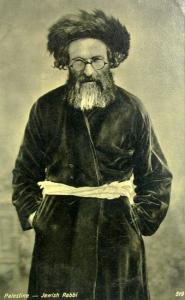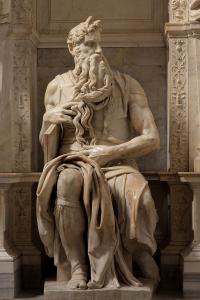 Jewish rabbis throughout the ages have loved this text, while many Christian readers have been bewildered by it. The reason for each reaction is not difficult to discern. Jewish readers of the Bible have regularly been more than willing to allow the very words of the text to guide their thinking about it, even if the road they feel called to traverse often is rich, rare, and exceedingly strange. In short, Jewish men and women are wildly open to new and challenging views that biblical texts quite often provide to them. On the other hand, we Christians have too often come to the texts with any number of preconceived ideas about what a given text simply must say if it is to comport with our deeply held theological and anthropological notions. If a text appears to challenge what we have long believed, we perform all manner of exegetical gymnastics to darn well make the text fit what we already embrace. Because this is a fair estimation of the basic differences between some Jewish interpretations and some Christian ones, we Christians have been unwilling and unable to learn all that we might from our Jewish colleagues because we just cannot imagine how freely they hear what we have a very hard time hearing. Exodus 32 is a classic place to demonstrate these central distinctions between readers.
Jewish rabbis throughout the ages have loved this text, while many Christian readers have been bewildered by it. The reason for each reaction is not difficult to discern. Jewish readers of the Bible have regularly been more than willing to allow the very words of the text to guide their thinking about it, even if the road they feel called to traverse often is rich, rare, and exceedingly strange. In short, Jewish men and women are wildly open to new and challenging views that biblical texts quite often provide to them. On the other hand, we Christians have too often come to the texts with any number of preconceived ideas about what a given text simply must say if it is to comport with our deeply held theological and anthropological notions. If a text appears to challenge what we have long believed, we perform all manner of exegetical gymnastics to darn well make the text fit what we already embrace. Because this is a fair estimation of the basic differences between some Jewish interpretations and some Christian ones, we Christians have been unwilling and unable to learn all that we might from our Jewish colleagues because we just cannot imagine how freely they hear what we have a very hard time hearing. Exodus 32 is a classic place to demonstrate these central distinctions between readers.
Of course, in the above readerly distinctions, I am rather grossly simplifying a vastly complex tradition of Bible reading. There are Jewish readers who bring to the biblical text any number of preconceptions, and there are Christian readers that are completely open to wherever their readings may lead—I consider my Christian self one of those—yet I think it is still fair to suggest that Jewish readers tend to be more open hearted in their readings than Christian interpreters. I assume this is so because Jesus plays a role in all of our Christian readings, more or less, while Jews are not so burdened with such a potent exegetical lens.
Exodus 32 is one of the Bible’s greatest stories, stunningly written, shatteringly devised to raise any number of very basic questions about what it means to be a human being and at the same time presenting a portrait of YHWH that fairly blows our theological minds. The tale begins with the absurd and horrifying creation of a molten calf (a literal meaning of the Hebrew description of the thing) by the priest Aaron, who has been deputized by the absent Moses to deal with any disputes that might arise while he is on the sacred mountain conversing with YHWH, who has called him up for a chat (Ex.24:14). It is astonishing enough that Aaron gives in so easily to the rising fear and fury of the people by acquiescing to their demand for a “god who will go before us;” even after he makes the thing, he observes how they go hog wild (please pardon my completely non-Jewish cliche) by having dinner on the grounds after a Hebrew service of worship, complete with food and drinking and what the NRSV euphemistically names as a “revel” (Ex.32:6). In fact, the word used is a reference to what Abimelech of Gerar witnesses going on between Isaac and Rebekah back in Genesis 26:8, actions that are not done between brother and sister; Isaac had lied to Abimelech about just who Rebekah was in fact—his wife. The reprobates at the base of the holy mountain engage in precisely the same behaviors as those between Isaac and Rebekah; “reveling” is quite tame unless one thinks of the wild revels of New Orleans on Mardi Gras.
Their disgusting behavior in front of their pathetic little calf is fully seen by YHWH, who initiates a dialogue with Moses on the top of the mountain, though any dialogue with YHWH threatens to be a monologue only. “Your people whom you brought out of Egypt, Moses, have corrupted themselves.” Ah, yes, Moses, I have looked at this lot, and they are stiff-necked, not unlike the pharaoh, and you must remember what happened to him” (Ex.32:8-9). Moses well remembers; the old pharaoh’s first-born son is dead, while he is now floating face down in the Sea of Reeds, according to this story. “Let me alone,” YHWH thunders, “so that my wrath may rage, so that I may swallow them whole, but of you I will make a great nation” (Ex.32:10).
One might imagine that YHWH’s speech gave Moses a moment’s pause. After all, who better than he knows just how terrible these people have been and are, not to mention that YHWH has also promised that he will be “ a great nation,” using exactly the words YHWH spoke to Abram way back in Genesis 12:2. To be rid of these cankerous people and to become the start of a new thing of God are two offers difficult to refuse! But Moses refuses and in a quite spectacular way. And how the rabbis love Moses here!
“Why are so furious, YHWH, about your people, whom you brought up from Egypt (not me!) with such great power and a mighty hand? What will those Egyptians think of you? They will just imagine that you had this evil destruction of the people in mind from the very beginning. Turn away from your fierce wrath; change your mind! Do not bring such evil on your people. Have you forgotten your covenant with Abraham, Isaac, and Israel, promising them vast descendants and a perpetual land in which to live forever” (Ex.32:11-13)? Rather than merely croon abjectly, “anything you say, boss,” Moses argues with a silver tongue that he claimed not to have back at the burning bush (Ex.4:10). The arguments may be summarized as: 1) you are the responsible party here, YHWH; 2) the Egyptians will think ill of you; 3) have you forgotten what you promised to the founders of the nation? Moses, right in the teeth of a raging YHWH, cools the God off and bids that God change the divine mind.
And that is exactly what YHWH does at Ex.32:14; YHWH changes the divine mind. Not only has Moses apparently saved the people from the out-of-control YHWH, but YHWH has listened to the prophet and has done precisely what Moses demanded. Thus, the supposed God who is the “same, yesterday, today, and forever” as the author of Hebrews memorably claimed, is plainly not the God of Exodus. Moses argues with God, and wins, and God changes the divine mind and refuses to do what initially God had determined to do. The rabbis joyfully received this tale, and saw in Moses the greatest figure in their history, the man who could argue with God. Well, it should also be remembered that Abraham, too, argued with God in Genesis 18, though the winner and loser of that argument may not be so clear cut as one sees here. Still, human beings may, indeed are urged, to take their God on. God apparently welcomes a healthy verbal tilt now and then. After all, Job was such a character who loved a good fight, and God spoke to him at the end at length, while saying but one sentence to the friends who thought they had God all figured out.
They did not and neither do we. If God can change the divine mind, and if God welcomes a struggle with God’s own creation, could it be that our Christian claims about God’s “impassability,” God’s “omniscience,” may not be the final word about this God? Could this story lead us, as it has led many over the centuries, to rethink our older ideas about who God is and about who we are in relationship to that God? Let Christians join our Jewish colleagues on the rich and challenging journey of struggling with God, of reexamining old ideas, of opening ourselves up to the newness of God, a God who resists easy pictures and settled ideas. Surely that God is something more like this moving and changing deity in Exodus who loves us enough to hear our anger and to stand with us as we grapple with our world and with the very God who made it.
(images from Wikimedia Commons)











